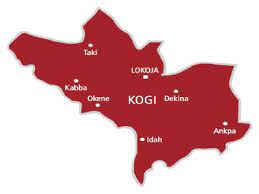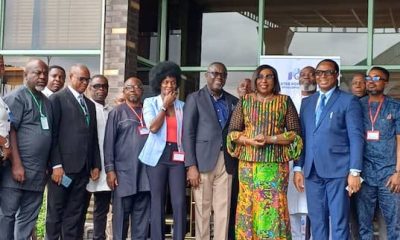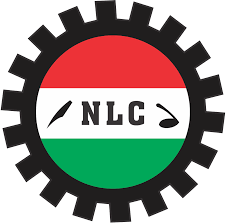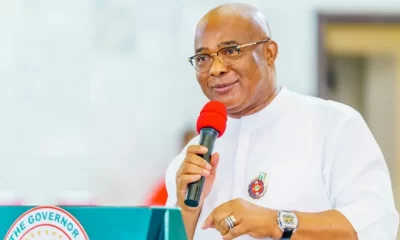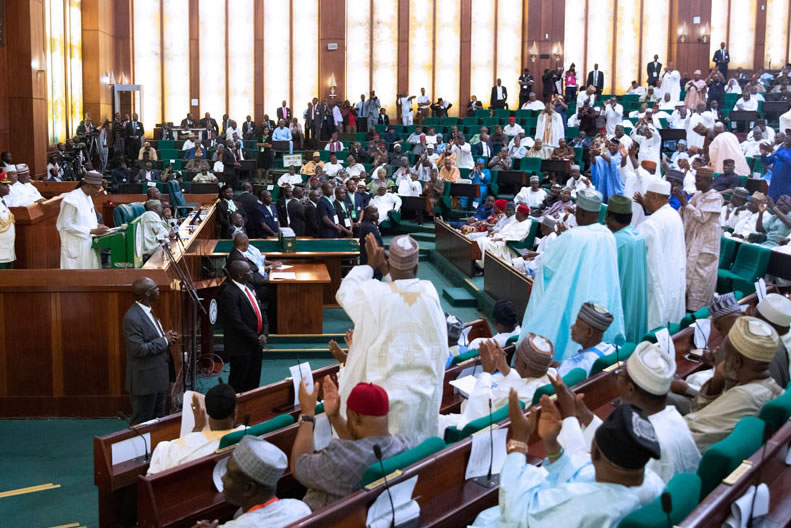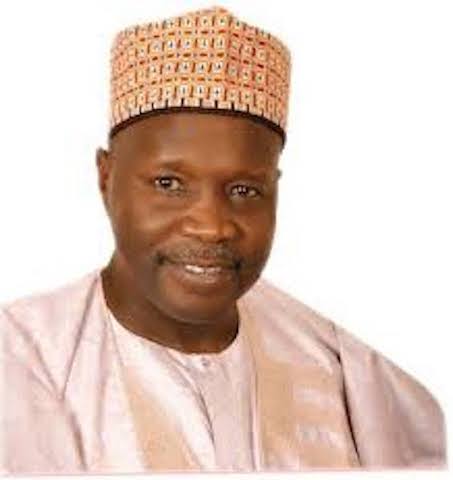FEATURES
Insecurity and the Attitudinal change to Gold Jewellery

Lately, Nigerians have been impacted by the level of insecurity ranging from armed robbery, kidnapping for ransom to banditry across the country.
The high rise of kidnapping in Nigeria, especially in the northern part of the country has become a sort of blossoming business or industry amid the country’s economic crisis.
Kidnapping for ransom has made lives unbearable for the citizens, as most Nigerians now live in fear of falling victims of the criminal elements day and night.
Nigerians have, however, devised different ways to survive the challenges and vagaries of life they are daily confronted with. This is characteristic of Nigerians adaptability culture.
Women are known be the major patrons of gold jewellery in Nigeria but the spate of insecurity has changed their love for this ornament of beauty. Some women have stopped wearing expensive Gold jewelleries as part of measure against insecurity, while some sold them off to wade off armed robbers, kidnappers and bandits.
Magdalene Okon, a civil servant, said that wearing of gold was not trending as it was in the past, adding that the high cost of gold over the years have made people to invest on land instead of gold jewellery that could be stolen in a twinkle of an eye.
” I like wearing set of gold jewelleries which comprise necklace, earing and bangles. But I have stopped that due to insecurity in the country.
“Recently, my uncle’s little children were kidnapped because their mother is known with massive gold jewelleries which attracted the kidnapers.
“I learnt from this terrible incidence and cautioned myself not to be wearing gold for now because the country is not safe, series of kidnappings are going on and insecurity in the land.”
Ms Aisha Abubakar, an undergraduate student, said women from the North are well known for adorning gold, such as Saudi gold, 22 carats jewelleries and above, adding that one hardly see most of them wearing gold nowadays.
She said that most women now wear costumes, such as Zeconia jewelleries for the safety of their lives.
“Before, my mother cannot do without puting on gold, she is so addicted to gold but she sold almost all the gold to pay for our school fees and also settle some debts when the cost of selling the precious metal to dealers became so lucrative.
“The gold came as a rescue, since she is the only one taking care of the family due to the death of our father. The product came handy to solve some financial burdens.
” My mother is now wearing costume jewelleries to occasion and due to insecurity in the Northern part, some of her friends have deposited their gold in banks while others found alternative options of safeguarding them.
” I have just a gold earring and chain but I have stopped wearing them especially on the campus due to the fear of the unknown, even when I wear them for an outing, I watch my back because they are expensive.”
Mrs Bukola Adekola, a 52-year-old civil servant in Abuja, said she could not do without buying the precious metal when they were affordable to compete with her friends and wear them to occasions.
Adekola said that Yorubas are known for wearing gold, saying “we invest in gold as future assets not just puting them on. The last time I bought a new gold was when a gram was sold for N3,800.
“I disposed all my gold I bought at N3,800 per gram last year when a friend told me that a gram was sold at N 24,000. It was like I won a jackpot because I sold all the gold I have and I made millions from them.
“What is the essence of having such opportunity of making cool money from asset like gold and still keeping it in the house for fashion with the current insecurity in the country.
” I now wear costumes to occasion and I am okay with that, at least I have invested the money on children education, business and others,” she said.
Mrs Chioma Nnamdi, a Nurse with a private hospital in Lagos, said that her husband wedded her last year with a silver ring due to high cost of gold ring.
“We wedded last year September because we planned it before the pandemic set in. Things were very expensive and we resorted to a normal ring. It is not about a gold ring, it is about the union and love we have for each other.”
Alhaji Dahiru Abdullahi, a Gold dealer in Abuja also decried low patronage of gold due to advent of COVID-19 and the economic melt down in Nigeria and the whole world.
“We don’t experience rush from customers again, rather, people are bringing the ones they have to the market for sale. Costume jewellery are now in vogue, especially Zaconia.
“Zaconia also has second hand value but we don’t measure them per gram for sale or when we want to buy from customers unlike gold jewellery.”
He said that buying a gram of gold was an asset, adding that many people invested their capital on gold for future security.
According to him, the current price of 18 carat new jewellery is N26,000 per gram while the 18 carat of fairly used jewellery is now sold at N19,000 per gram. 21 carat of new gold jewellery is now N32,000 per gram and 21 carat of fairly used jewellery is sold at N21,000 per gram.
“These are current international prices. The amount I sell gold or buy from customers are the same with other gold dealers, we use international standard rate.
“We don’t cheat customers because they are in need of money and they want to sell their gold. We buy gold according to international rate as at that moment. The prices fluctuates but we follow the international rules and standards of selling and buying.”
FEATURES
Bobrisky, Naira Abuse and Matters Arising

In February 2024, the mass media was awash with reports of the arrest of Bassey Idio for currency racketeering by operatives of the Uyo Zonal Command of Economic and Financial Crimes Commission (EFCC).
The 59-year-old ‘naira trader’ was apprehended following intelligence and surveillance revealing his illicit cash transactions involving both local and foreign currencies.
He was found selling N700,000 new Naira notes, comprising 12 bundles of N500 notes totaling N600,000, and a bundle of N1000 notes amounting to N100,000.
Idio, later confessed to the crime and was convicted.
Before then, in a widely circulated video, Federal lawmaker Ibrahim Abuna was seen distributing money to a crowd presumed to be his constituents.
Abuna was representing Mafa, Dikwa and Konduga federal constituency of Borno inthe House of Representatives.
He demonstrated his generosity by tossing money from a balcony, disregarding the potential risk of a stampede as people fought to catch the airborne naira notes.
The recipients consisted of young men and women, as well as elderly persons.
Sadly, no arrest or conviction was made since 2021 when the video was made.
On daily basis the Abuna scenario is repeated in different parts of the country as celebrities and politicians try to outdo one another as they engage in money spraying at social events and even political gathering.
Recently, there was a dramatic twist in this otherwise “normal” behavior among Nigerians as a Federal High Court in Lagos sentenced Idris Okuneye ‘!Bobrisky’, a popular crossdresser, to six months in prison for naira abuse.
Justice Abimbola Awogboro, popularly known as Bobrisky, who was prosecuted by the EFCC, was jailed as a deterrent to those that may engage in naira abuse.
The judge also said that Bobrisky should use his influence to teach people about legal money practices.
He said Bobrisky’s offence is contrary to, and punishable, under Section 21(1) of the Central Bank Act 2007.
Naira abuse has been illegal in Nigeria for a long time, but spraying naira notes or throwing its bundles during social events has been a tradition in Nigeria for many years but unfortunately those in indulge in them have not been brought to book under the Act.
The Act recognses naira abuse to include actions like throwing, stamping, engraving, selling, and mutilating the currency. They carry a penalty of a ₦50,000 fine or six months in prison.
According to the Act, tampering includes impairing, diminishing, or lightening coins or notes, as well as defacing them through stamping, engraving, mutilating, or other forms of deliberate abuse.
It notes that spraying, dancing, or stepping on the naira during social occasions or otherwise is considered an abuse and defacing of the currency, punishable under this Act.
A financial expert, Mr Rilwan Afolabi, says the Act aims to protect the integrity and value of Nigeria’s currency by imposing strict penalties on those who tamper with or abuse it.
According to him, by defining various forms of tampering and abuse, including common practices like spraying or dancing on the naira during social events, the Act seeks to deter such behaviours land promote respect for the currency.
“The inclusion of penalties for hawking, selling, or trading in Naira notes further reinforces the seriousness with which the law treats any actions that could undermine the currency’s stability and legitimacy.
“Overall, the Act reflects the CBN’s commitment to maintaining the integrity of Nigeria’s monetary system and ensuring public confidence in the national currency,” he said.
However, many people think the punishment meted to Bobrisky was too harsh and want leniency, while others suggest community service for non-violent crimes like this.
Social activist, Aisha Yesufu, has criticised Bobrisky for admitting guilt to the charge of naira mutilation.
In a write-up on X, formerly known as Twitter, Aisha wondered why Bobrisky quickly admitted guilt.
“Who advised him to plead guilty?”, she screamed, while raising concerns about how spraying money could be equated to mutilating money and why the law is selectively enforced.
She added: “Worst case scenario, I would have advised him to plead ‘No Contest.’
Yesufu raised more posers: “If spraying money is considered mutilation, then what about politicians throwing money at people?
“Mutilation and spraying money how are they the same? Did Bobrisky pick a scissors and started shredding the Naira
“We just have a jungle where anything goes because some people’s morality is offended.
“If Bobrisky has crimes he has committed, prosecute him on those and not this selective prosecutions.”
Also reacting, Deji Adeyanju, a lawyer and social activist, expressed concern over the six-month sentence handed to Bobrisky.
The sentence, delivered without the option of a fine, has raised questions about the severity of punishment for what some perceive as a cultural practice.
While acknowledging the importance of upholding the law, Adeyanju highlighted Bobrisky’s status as a first-time offender and his pledge to utilise his platform to raise awareness against Naira mutilation.
He urged the courts to consider the cultural context surrounding such offenses and emphasised the need for extensive public sensitisation before prosecution.
The issue of selective enforcement was also raised, as Adeyanju questioned why he was singled out for prosecution when others were reportedly engaged in similar acts during the event in question.
He cautioned against the perception of bias in law enforcement and called for a fair and impartial approach to justice.
In light of these concerns, Adeyanju proposed an alternative approach to handling such crimes as Naira mutilation, advocating community service as an ppropriate form of punishment.
He reaffirmed his commitment to upholding the rule of law and protecting human rights while urging security agencies to consider alternative measures for addressing such offenses.
Adeyanju said that the ongoing debate surrounding Bobrisky’s sentence underscored broader discussions about cultural practices, law enforcement and the balance between tradition and legal compliance in Nigerian society.
As stakeholders continue to weigh in on the matter, it remains to be seen how authorities will address the complexities surrounding Naira mutilation and similar offenses in the future.
Also, they call for comprehensive campaigns on the importance of preserving the integrity of naira.
Such initiatives, they say, could help instill a culture of respect for the currency and discourage behaviours that undermine its integrity and value. (NANFeatures)
FEATURES
President Tinubu at 72: Celebrating a Life in Forward Motion

By Keem Abdul
He is 72 on Friday, March, 29, 2024. But in a nod to the current mood across the nation (occasioned by the hardship and insecurity in the land) President Bola Ahmed Tinubu has said he wouldn’t be celebrating that auspicious day.
Instead, according to a release from his media office, he has told his friends, well-wishers and associates to donate to charity rather than spend valuable resources placing goodwill messages and advertorials in print and electronic media outlets to mark the day.
The president, according to the release made particular reference to the tragic killing of a number of soldiers and police officers in Delta State, as well as the serious security breaches by criminal elements in various parts of Nigeria (which has led to an unacceptably high toll of death, injury and loss of property) as reasons why a celebration at this time would be grossly inappropriate – if not downright insensitive.
In place of a celebration, Tinubu says he would use the day to reflect and re-dedicate himself to the task of building a more stable, secure, prosperous and united Nigeria – in line with his mandate as the leader of the commonwealth, namely, to make life better for all her citizens. He, however, acknowledged as some sort of a birthday gift, the recent release of the students kidnapped some weeks ago in Kaduna and Sokoto States. But a gift of far greater import, he added, would be the emergence of a more stable, more secure, virile, prosperous and united Nigeria.
That being said, though, even as the President reflects on his life’s journey so far and his ascendance to the highest office in the land at this time, many Nigerians and even non-Nigerians will also be pondering the phenomenon called Asiwaju Bola Ahmed Tinubu, GCFR, the combination of qualities and attributes (and the unique set of circumstances) that have brought him to this moment in his life and in the evolution of the Nigerian nation.
It is hard to measure the essence of a life as multifaceted and dynamic as that of the man Bola Tinubu. Suffice it to say – as those who know him well have repeatedly done – that he remains an enigma. That description of one’s essential character may be a cliché, but in the case of Asiwaju Bola Tinubu, it is all too true.
Since the advent of Nigeria’s current democratic dispensation in 1999, Asiwaju Tinubu has become perhaps the most constant factor in defining the outcomes of electoral contests in the country – and even more so in his home state of Lagos. His almost 100% success rate in this regard is not by accident. A great writer once said that the heights great men attained are ‘not by sudden flight.’
Tinubu’s success as a politician testifies to his capacity for deep reflection and prompt action in equal measure.
On one hand, he has always been deliberate and intentional in the planning and execution of his strategies, doing nothing that is superfluous or forced. His caution, in other words, is matched by his ability to execute his plan – in a way that meshes into the whole vision which he has crafted for himself and the people that he leads. Every step he takes has been methodical and fills a gap in his overall quest for the enthronement of a continuous cycle of progress and prosperity within his sphere of influence.
He is a man with extra ordinary sensory perception who’s in tune with his inner self thus making him understand that there’s no force on earth strong enough to restrict the procession of promises of God. His perception wasn’t tainted by experience of betrayals rather he recognised that’s there’s no betrayal that he went through that didn’t work together for his good, that there’s never a dagger thrown at him that God didn’t convert to a stronger him.
1999 to date has been a time of almost constant struggle for Asiwaju Tinubu. His battles with the federal government, and with the internal opposition in Lagos, are too well-known to recount here. But the question is: Why does he fight so hard, For whom, or what, is he fighting? Wealth? Power for power’s sake? Fame and recognition? If so, why does he still keep fighting NOW, even AFTER having acquired these things in some measure?
One unmistakable answer to these questions – no matter one’s background or political and religious affiliation – would be that Asiwaju Tinubu is a man driven, not just by personal ambition or group interest, but by the altruistic desire to confront the forces of economic underdevelopment and social rot, no matter what it may cost him personally. His willingness to go all out in pursuit of his goals and convictions – even if it means sacrificing himself for others and the society as a whole, is truly remarkable.
In the rough-and-tumble of Nigerian politics where elections are usually a clash of weapons rather than a contest of ideas and ideologies, and most politicians are devoid of both, Tinubu’s principles and idealism can be hinged on the simple South African maxim of “Ubuntu” (I am because we are).
This understanding of the value of an unshakable bond between brethren is what has shaped the dynamics of Tinubu’s actions and engagements with other stakeholders. On more than one occasion, he has professed a desire to build the community; the people in it and the institutions and traditions that govern them – based on his belief that once a society is healthy; all elements within it will be significantly impacted.
It is also the reason he has built the careers of so many other leaders, men and women who have gone on to become political giants in their own right since 1999 – again, based on his belief that various people with diverse capacities in various places can coalesce to build a better and stronger society. No matter what his detractors may say, Tinubu’s investment in the lives and political fortunes of others is far from personal or individualistic, far from it.
Many distinguished persons in the society are the products of this investment. The results so far are a demonstration of the fact that the power to make a difference in the lives of Nigerians is within his grasp – and in our grasp if we all make an effort.
Much has been said about the Jagaban’s unique combination of fearlessness and humanity. Though he never goes out of his way to court controversy, he never runs away from one, especially when he has restrained himself and sought all ways to seek rapprochement with the other party. His capacity for compromise and respectful dialogue is how he has been able to build a team of highly dedicated men and women around himself.
As his close associates mark his 72 years on earth (one way or another) or join him in his reflections on the state of Nigeria and his mandate to lift the country and its people out of our present quagmire, it’s the prayer of all right thinking and patriotic Nigerians that the good Lord who has seen fit to allow Tinubu to occupy that lofty position will keep him in good health and preserve him so that he can fulfil the purpose for which God brought him into existence, that God will strengthen him, equip him with the physical energy and profound wisdom, understanding and knowledge that he needs to drive the vision that transformed Lagos into a globally-competitive megacity and the 5th largest economy in Africa.
His promise to replicate that transformation on a national scale is still on track, and with the help of God and the committed cooperation of the Nigerian people, the mission will be fulfilled.
Happy birthday, Mr. President!
May your strength be Renewed. God bless Mr. President. God bless Nigeria.
Keem Abdul, publisher and writer, hails from Lagos. He can be reached via +2348038795377 or Akeemabdul2023@gmail.com
FEATURES
FCT Residents Squeak over Food Prices Soar, FG urges Patience

Nigerians in the Federal Capital Territory (FCT) are concerned over the continued instability and increase in the cost of essential goods and services in the city centre.
Headline inflation rate released by National Bureau of Statistics (NBS) in February showed that inflation rate surged to 31.
70 per cent, with food inflation hitting a staggering 37. 92 per cent.These inflation pressures have led to significant volatility in the prices of essential commodities, posing a challenge to the livelihoods of many residents.
Inflation is a decrease in the purchasing power of money, reflected in a general increase in the prices of goods and services in an economy.
It is typically a broad measure, such as the overall increase in prices or the increase in the cost of living in a country.
The spike in food inflation in Nigeria has made it increasingly difficult for many families to afford essential food items, leading to concerns about food security and access to nutritious meals.
The rising cost of transportation has added to the financial strain on residents, making it harder for workers for instance, to commute to work and access basic services.
Due to these developments, there is a pressing need and call for measures to address the underlying causes of inflation and ensure price stability for essential goods and services in the country.
According to residents, it is essential to implement policies that can effectively address the inflation challenge and stabilise prices.
They, therefore, urge relevant authorities and policymakers to take steps to mitigate the impact of inflation on the daily lives of the people.
They further urge that efforts that would enhance food security and support vulnerable households should be prioritised to mitigate the adverse effects of inflation on access to food.
Mrs Anthonia Yusuf, mother of three, expressed her distress over the soaring prices of food items, saying it is becoming increasingly difficult to put food on the table for her family.
“The prices of basic food items like rice, beans, and cooking oil have almost doubled in the past few months. I am deeply worried about how we will cope if this trend continues.
“ As a mother, I feel for children out there without parents. I cannot even imagine how they are able to fend and survive with the increased cost of living we are experiencing,’’ she said.
Also, another resident, Mrs Patience Akpa said: “Thse days, I do not attach prices to the list of items I intend to buy form the market because I cannot guarantee that the price would still remain the same.
“This is not good for us, we cannot even afford to plan because we do not know what tomorrow holds or will bring to our door-step.
“ We pray and hope the government and people in charge of policies will look into this unstable and increasing cost of living in the country.’’
Similarly, Mrs Favour Akputu said :“ my family is now living one day at a time and our only hope is in God whom we are trusting will continue to provide our needs.
Mr Ibrahim Usman, a civil servant, highlighted the ripple effects of the inflation on transportation costs.
“Commuting to work five days in a week has become a financial burden due to the rising transport fares.
“With the increasing cost of living, my salary is no longer sufficient to cover these additional expenses, thus, something needs to be done to address this issue speedily,” Usman said.
Similarly, Ms Ngozi Okoro, a small business owner, shared her concerns about the impact of inflation on her enterprise.
Okoro said as a retailer, she had witnessed a decline in customers as they struggled to cope with the escalating prices of goods.
She said :` This is affecting my sales and profitability, and I fear that if this persists, I may be forced to close down my business because right now I am even managing to cope and stay in business.
“And if that happens, my family will suffer because this business is the only source of income I have to support my husband who his taxi driving barely provides the need of the family.’’
For his part, Mr Moses Osita, a student, underscored the challenges faced by his peers, especially students from low-income backgrounds.
“ Many of my peers are finding it hard to afford meals on campus. The higher food prices have made it difficult for students with limited financial resources to meet their basic needs.
“ This is affecting our academic performance and well-being. If the youths are truly` leaders of tomorrow’, then something needs to be done urgently, because we are currently uncertain of our tomorrow,” Osita said.
Meanwhile, Mrs Fatima Adajime, a retired worker, drew attention to the plight of senior citizens of the country, the retired individuals.
“As a pensioner, I rely on my fixed income to cover my expenses. The steep increase in food prices has eroded the purchasing power of my pension. It is disheartening to see fellow retirees struggling to afford essential items.
“Due to our age, a lot of us suffer one health challenge upon another and the cost of drugs is nothing to write home about, these challenges needs urgent solutions by relevant quarters,’’ Adajime said.
According to Mr Francis Adams, a financial expert, many Nigerians are currently struggling with hardship due to government reforms including the removal of petrol subsidy.
Adams said the depreciation of naira had eroded incomes and savings of many, adding that this had worsened with Nigeria’s increased headline inflation rate recently released by the NBS.
He is, however, optimistic that if well managed, the reforms will yield positive dividends in the future.
He said as Nigerians continued to grapple with the repercussions of soaring inflation,
He urged the government to, in the interim, implement policies that would cushion the effects of inflation on the citizens.
“It is imperative for authorities to take decisive action to mitigate the impact of inflation and ensure the well-being of the populace’’, Adams said.
According to him, the pursuit of price stability is crucial in safeguarding the well-being of Nigerians and fostering a more sustainable and equitable living environment.
President Bola Tinubu has called for patience as his administration navigates the economic situation considered unpleasant by many Nigerians.
“I would like to solicit for understanding and support of Nigerians towards the government’s economic reform programmes inspired by the difficulties involved.
“We are very much hopeful that these policies will yield the desired results in no distant future”, Tinubu said through Prof. Tahir Mamman, the Minister of Education at the 43rd graduation ceremony of Ahmadu Bello University Zaria. (NANFeatures)










